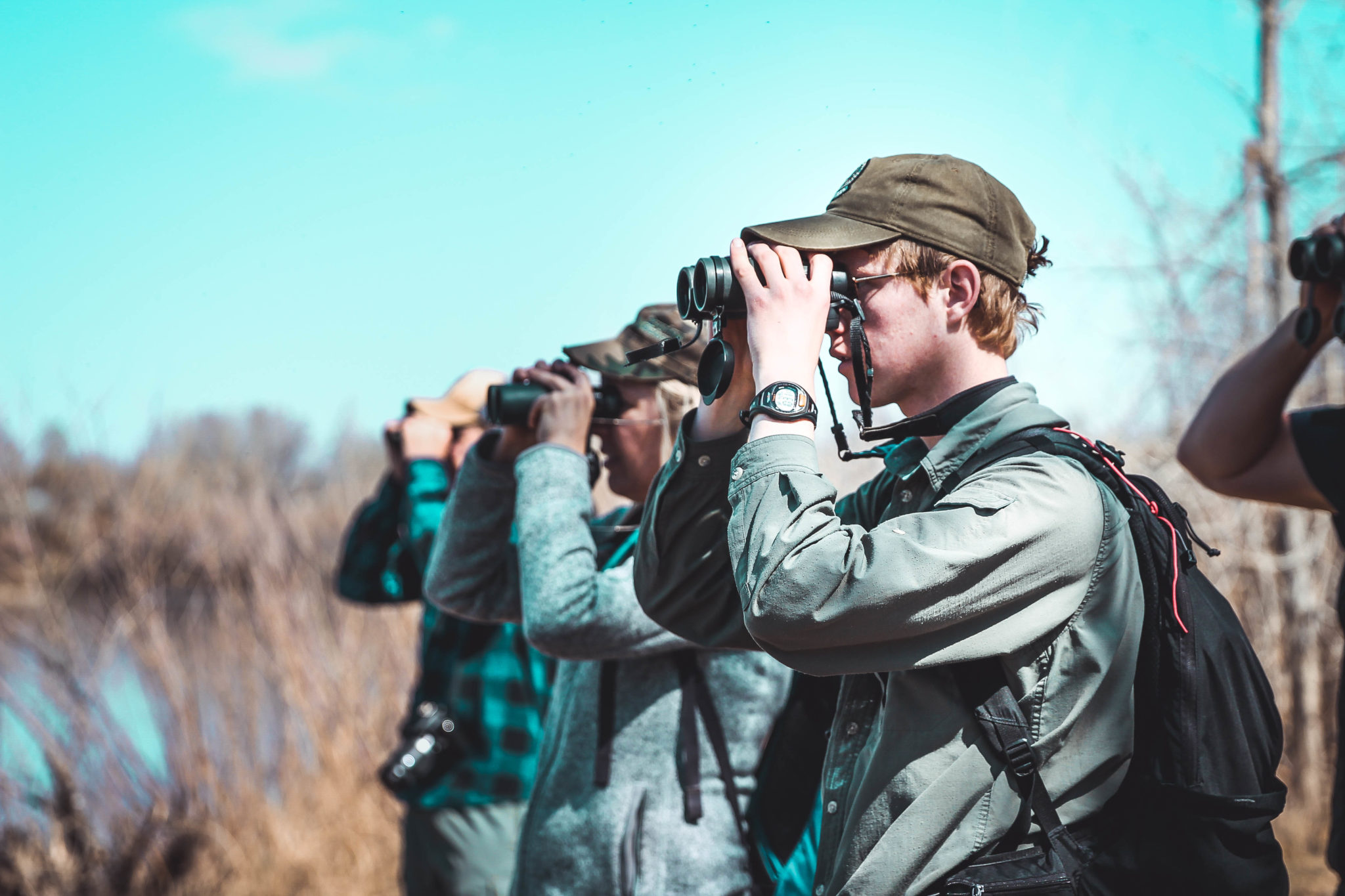
By Brigid McCreery
“Hey, look! Over there!”
Francis Commercon directs the attention of four fellow bird enthusiasts to two Northern Harriers, who are exhibiting a thrilling example of courtship behavior in midair. The birds’ silhouettes circle each other over a field of cattails against the bright blue morning sky.
“He’s got a mouse … he’s loosening the grip of his talons … he passed it off to her! Aw, it’s love!”
Commercon and his teammates from the Colorado State University Ornithology Club are competing with two other teams this morning to see who can spot the most birds. Since 5:30 a.m. they’ve spotted 70 species. The goal of the day? 100.
“Hey Francis, who’s this?”
All binoculars swing towards a small bush where Commercon identifies a white crowned sparrow doing its lively dance.
Commercon has endless knowledge of the birds around us. Through all the myriad calls, human recreation noises, and camera shutter, he can isolate the sound of every call to inform his teammates of what they’re seeing and hearing.
By the end of the day, the team identifies 107 species total.
He’s been studying, watching, and banding birds since the fifth grade. When tasked with doing a project about his passion, he said he spontaneously decided that it would be birds and has stuck with it ever since.
“I love birds particularly because for me, birds really connect you with the land. You feel connected to a place,” he said. “For example, if I go up into the spruce fir forest, I know that I’ll meet the American three-toed woodpecker, and the gray jay, and there’s the clark’s nutcracker – he’s always there. This is where they’re supposed to be. It’s an integral component of a place.”
Building community
His interest grew from this spontaneous decision when he and his mom began to engage in the birding community, going on walks and volunteering with organizations like the Bird Conservancy, Audubon Society, and Denver Field Ornithologists. These activities kept his bird interest alive and sparked his interest in citizen and community-based science.
Commercon’s enthusiasm is contagious, and with it has built an entire community at CSU. He and Megan Miller co-founded the CSU Field Ornithologists club nearly four years ago during his freshman year. The group does everything from monthly birding trips to hosting guest speakers to engaging in ongoing citizen science projects to traveling to Trinidad and Tobago for international birding experience to art workshops where students can learn how to sketch birds.
“It’s natural to love birds, and everybody has their different ways of enjoying it,” he said. “Some people like to look and see the colors and hear the sounds, others really enjoy the competitive aspect, some enjoy the volunteering aspect.”
Expanding horizons
Commercon has taken his love of birds around the world. He has been to China four times and completed his honors thesis there, in an ethnic minority rural community in Yunnan province of southwestern China, where incredible biodiversity contends with rapid economic growth. There, he has discovered a unique community of Chinese ecologists and conservationists.
“There’s lots of people that are passionate about nature that want a sustainable relationship between humans and the environment,” he said. “They’re earnestly passionate about and they’re working hard.”
It was here that Commercon understood how difficult, but also how important, the social sciences of conservation are. He said that in his interactions with villagers and experiences interacting with the land, he learned that you can never be 100 percent certain of what people say. Neither villagers nor researchers may have the full story, but it is important to understand the interactions between those groups and the cultures at play.
“There needs to be a rapport between conservation actors and the people it most directly affects,” he said. “Setting a reserve, or a national park, or a national monument, for example, the whole country might benefit, but the people living right next to it, they’re the ones that are most directly affected, so they’re the ones whose actions will most directly affect that park. So that’s the most important relationship to improve.”
Commercon will be giving the student speech at Saturday’s Warner College commencement ceremony. After graduation, his next step is to travel to China on a Fulbright scholarship and spend 10 months furthering his language and social sciences studies, working to engage local communities in conservation and environmental protection.
“Science is not something that just researchers at research institutions and universities do,” he said. “If the community is producing the knowledge, then they can use it and learn about what’s in their own backyards. It links research and building of knowledge with community.”